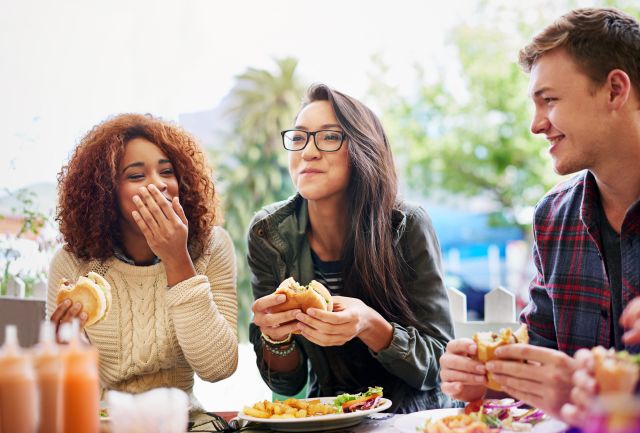Updated on November 11, 2022.
You're unwinding with friends at the local pub for a bite to eat. Now it's your turn to order. That salad sounds tasty—plus it's healthy—but everyone else either picked a personal pizza or a half-pound burger. You decide not to stand out. Before you realize it, your belly is full of beef and fries and you're reaching for the antacids.
Does this situation sound familiar? Your peers may have a lot more influence on your eating habits than you think.
Eating to fit in
In a 2014 review published in the Journal of the Academy of Nutrition and Dietetics, British researchers analyzed 15 studies that looked at the way peer pressure affects what and how much people eat. The evidence consistently showed that people tend to follow the crowd. If you see others making low-calorie or high-calorie choices or eating large portions, you’re likely to follow suit.
Following this peer influence is a way of “reinforcing identity to a social group,” the researchers explained. Translation: We just want to fit in. Even when we have nutritional information to help guide our choices, peer effects often take over. We may not realize the impact our friends have on our eating habits and we continue to copy them even when we’re eating alone.
Peer influence isn’t strictly negative. A 2015 study published in PLoS One analyzed workplace behaviors associated with healthy eating. The study showed that participants who saw their coworkers eat fruit and vegetables were more likely to eat at least one fruit or vegetable daily.
Another study looking at the cafeteria food purchases of nearly 6,000 employees of Massachusetts General Hospital backed up those findings. Researchers found that food choices were similar among people who were socially connected. What’s more, according to the study, published in 2021 in Nature Human Behaviour, the social effect was stronger for healthy foods than for unhealthy ones.
Perhaps not surprisingly, the social effect of food selection appears to apply across social media channels, as well. In a 2020 study published in Appetite, researchers found that British university students who observed their friends’ eating habits online ate an extra fifth of a portion of fruits and vegetables for every one serving of produce their pals posted about. The effect appeared to work for junk food as well. If social media users saw their friends posting about indulging in snack foods and sugary drinks, they helped themselves to similar fare at a rate of one extra portion for every three their friends appeared to be enjoying.
The health consequences of peer influence
What you choose to eat can have a significant effect on your body. Consuming foods high in saturated fat and sugar can put you at higher risk for developing obesity, cardiovascular disease, and diabetes. To what extent can the eating habits of friends and loved ones alter your health journey?
A 2007 study published in the New England Journal of Medicine found that having close friends who became obese raised the risk of a friend becoming obese during the same period of time by 57 percent. This increased risk occurred with siblings (40 percent) and spouses (37 percent), as well. A 2012 systematic review in Social Science & Medicine of 16 published studies looked at social influences on body weight and found in some research that a person was 3.5 times more likely to be obese if that person had friends who were obese. How much of that effect that comes directly from eating behaviors needs more exploration.
For now, it makes sense to be mindful of your eating environment. The next time it feels like your pals are pushing you to make an unhealthy decision in your diet, make a conscious effort to select the food that you know you want to eat. It may help to review the menu in advance and make a plan about what to eat before you arrive at the restaurant.
Even if the people around you don’t share your goals for healthy living, you can still stick to yours. By doing so, you may even be influencing your friends to eat healthier in the process.







